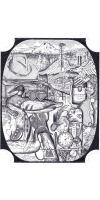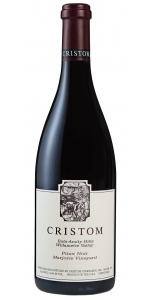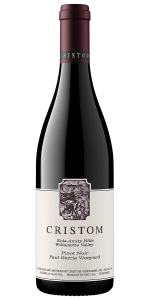Wine from Cristom

Cristom Vineyards was established in 1992 by the Gerrie family to grow and craft distinguished wines of place that honor individual sites and traditional techniques. Family-owned for over thirty years, we remain stewards of our east-facing volcanic hillside in the Eola-Amity Hills focused on growing benchmark Pinot Noir and Chardonnay. Bringing together biodynamic and organic farming methods, we farm the land with the next 100-years in mind. Our winegrowing centers on the philosophy that the greatest expression of terroir produces the finest wines. The cornerstone of our winemaking is rooted in traditional methods – site selection, low yields, whole-cluster fermentation and native yeasts – to produce balanced, dynamic wines of intensity, structure and length.
The Cristom logo was commissioned as a sort of ‘coat of arms’ for Paul Gerrie. It was created by the artist Timothy Tyler. The name Cristom honors the Gerrie’s two children, Christine and Tom. Hover over each element on the crest to learn about the specific elements.
We think in terms of centuries at Cristom and are led by a commitment of what this land and company will be one-hundred-years from now. The decisions we make on a daily basis are guided by the belief that we are working toward something bigger than ourselves and the value and outcome of our work is going to last beyond our own lifetimes. Cristom seeks to build an enduring brand known first for a special piece of winegrowing land that sustains far beyond a human working lifetime. Our wines are a product of a number of uniquely driven individual lifetimes and interpretations of land, craftsmanship governed by a handful of values and principles carefully nurtured over time.
The Marjorie vineyard sits in the center of the Cristom Estate with a gentle slope from 480 feet to 600 feet over some of the most consistent volcanic soils on the entire Estate. A little bit unique to itself, most of the Vineyard is planted over a moderately deep volcanic soil with some very rocky areas in the north and southeast corners. The vineyard wants to produce elegant wines of finesse with bright red fruit and succulent acidity.
Review:
Dark ruby, the 2021 Pinot Noir Marjorie Vineyard takes on a darker mineral profile with forward aromas of wet stone, black raspberry preserve, and layers of baking spices and crushed purple flowers. Moving to the palate, the wine is medium-framed, with ripe tannins, an angular texture, fresh acidity, and a spicy finish. This certainly needs more time and will gain complexity with time in cellar.
-Jeb Dunnuck 95 Points
Darkly alluring, the 2021 Pinot Noir Marjorie Vineyard is perfumed with dusty violets and lavender, giving way to dried black cherries. Luxuriously round, with juicy acidity, this cascades across the palate with crisp raspberry fruits as rosy inner florals amass toward the close. Hints of blood orange pucker the cheeks as the 2021 finishes staining and long with long lingering chalky mineral tones.
-Vinous 95 Points
Aromatically the wine lifts from the glass with a combination of perfectly ripened red and black fruits, with a graphite smokiness and a hint of mulling spices. On the palate, their is a youthful tannic structure and a floral flavors alongside the fruity notes.
Spicy cologne lifts from the 2021 Pinot Noir Paul Gerrie Vineyard, with both high-toned and darker notes of sage, menthol, bergamot, and cranberry cocktail. Medium to full-bodied, it’s tightly coiled, with tremendous length, gripping ripe tannins, a bright spine of acidity, and mouthwatering salinity that lasts long on the finish. It offers up great mineral texture and will need 3-5 more years in bottle.
- Jeb Dunnuck 96 Points
- back
Selected Options
Wineries
Categories
Pricing
Countries
Regions
Grape Types
Wineries
Organic/Free Shipping
EnRoute Winery Les Pommiers Pinot Noir is made from 100 percent Pinot Noir.
Aromas of fresh raspberry compote are complemented by notes of baking spice, and fresh rain on a forest floor. Generous-yet-soft strawberry preserve flavors expand on the palate, with elegant, silky tannins. A mouthwatering acidity glides across the finish.
Review:
Vibrant ruby in color, this wine erupts from the glass with aromas of sweet cinnamon, cola and cherry. There is a charming delicacy here, with flavors of dried rose petal, cherry and berry pie filling on a midweight palate. A captivating dance between the snappy tannin structure and the lively acidity of this wine lead to a very pleasurable finish.
-Wine Enthusiast 93 Points
GRAPE
100% Arneis
POSITION
Hillside
EXPOSURE
Southwest
COLOR
Straw yellow with greenish reflections
NOSE
The bouquet is fruity with hints of chamomile and acacia
TASTE
Fresh elegant, fruity aromas with floral hints
TEMPERATURE
Ideal serving temperature is 8°/10°C.
ALCOHOL
12.5 % - 13%






